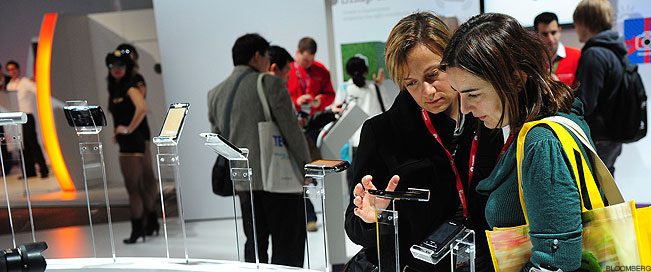Apotheker Seeks to Save HP’s ‘Lost Soul’ With Software Growth
March 09, 2011, 12:31 AM ESTBy Aaron Ricadela
March 9 (Bloomberg) -- Leo Apotheker stood before 4,000 Hewlett-Packard Co. colleagues Jan. 31, shielded from the afternoon Bangalore sun by a vast white tent.
Speaking with the accent that betrays his German roots, Apotheker vowed that as chief executive officer of Hewlett- Packard he would treat India more as a market than a source of low-cost labor for product development, as it did under his predecessor Mark Hurd.
CEO since Nov. 1, Apotheker is breaking with Hurd’s legacy in other ways. He’s overhauling HP’s $41 billion personal- computer division and says he will use acquisitions to expand in the software market, dominated by rivals such as Oracle Corp. and International Business Machines Corp. Apotheker is reversing Hurd’s emphasis on cost-cutting in a bid to improve product quality and spur home-grown technology, and he’s touring HP’s offices to find ways to get products to market more quickly.
“HP has lost its soul,” he said in an interview at Hewlett-Packard’s headquarters in Palo Alto, California, offering a glimpse of the vision he will outline in greater detail at an event on March 14 in San Francisco. “The first thing I wanted to do when I joined HP was listen to the people. The rank and file usually know about all the shortcomings.”
Apotheker, 57, resigned as CEO of German software maker SAP AG in February 2010 amid falling sales, clashes with unions over job cuts and a price increase that vexed customers. He takes the helm of a company facing slowing revenue growth and accelerating competition in cloud computing, a fast-growing area of technology that delivers software and storage via the Internet.
HP’s Cloud ‘Gap’
“There seems to be a gap between what kind of services HP offers and what kind of services people actually need,” said Jane Snorek, who helps oversee about $75 billion at Nuveen Asset Management, which sold Hewlett-Packard shares after Hurd’s Aug. 6 departure. “People in IT today want their service organizations or consultants to tell them, ‘What does the cloud mean to me?’”
Hurd resigned after the company said inaccurate expense reports filed by him or on his behalf concealed a personal relationship with a contractor, in violation of HP’s standards of business conduct.
The new CEO says he’s likely to buy more companies with software expertise, following HP’s Feb. 14 acquisition of data- analysis company Vertica for an undisclosed price. He said he’s on the lookout for targets that will help HP beef up security and equip customers to analyze large amounts of data.
“I happen to know something about software,” said Apotheker, who spent more than 20 years at SAP, the world’s largest maker of business-application software.
Possible Software Targets
Informatica Corp., BMC Software Inc., SAS Institute Inc., Symantec Corp. and CommVault Systems Inc. are among potential targets, said Jayson Noland, an analyst at Robert W. Baird in San Francisco, who has an “outperform” rating on HP shares.
Even after the $13.2 billion acquisition of Electronic Data Systems Corp. -- a deal designed to help it expand in computer services -- HP’s services revenue rose less than 1 percent to $34.9 billion in the year that ended Oct. 31. IBM’s services sales increased 2.6 percent to $56.4 billion in 2010. HP’s software sales were $3.59 billion last fiscal year, compared with $22.5 billion for IBM in 2010.
Two companies not on HP’s radar, Apotheker says, are SAP and Salesforce.com Inc., which specialize in applications that help businesses handle such tasks as payroll, financial reporting and customer-relationship management. HP has “no interest” in the kinds of business programs those companies sell, he said in the Feb. 28 interview.
WebOS on Every PC
Apotheker says he also wants to make better use of WebOS, the computer-operating system acquired last year when Hewlett- Packard purchased smartphone maker Palm Inc. for $1.2 billion. Starting next year, every one of the PCs shipped by HP will include the ability to run WebOS in addition to Microsoft Corp.’s Windows, Apotheker said.
The move is aimed at enticing software developers to create a wider range of applications that would differentiate HP PCs, printers, tablets and phones from those sold by rivals.
“You create a massive platform,” Apotheker said.
Programmers have built more than 350,000 apps for devices made by Apple Inc. and more than 250,000 for Google Inc.’s Android Market. WebOS has 6,000 apps, according to HP.
“Their Achilles’ heel is software,” said Brian Marshall, an analyst at Gleacher & Co. in San Francisco, who has a “buy” rating on HP shares. Hewlett-Packard gets 70 percent of sales from computers, storage, networking and printers, 27 percent from providing information-technology services, and 2.2 percent from software.
Slowing Sales Growth
Hewlett-Packard’s sales may rise 4 percent in fiscal 2011 and 2012, analysts surveyed by Bloomberg predict, compared with an average 8 percent increase annually under Hurd. HP forecast quarterly and annual sales on Feb. 22 that missed analysts’ projections amid lackluster consumer demand and sinking services revenue.
Hurd boosted sales and shareholder returns through more than $24.3 billion in acquisitions. His cost reductions included a 5 percent pay cut for most employees in 2009, lower research spending and plans to eliminate at least 48,000 jobs. Costs that include research and development as well as selling, general and administrative expenses fell to 13.5 percent of sales by the end of last year from 17.6 percent of sales in 2005, when Hurd started, according to data compiled by Bloomberg.
The decline in research and development and Hurd’s aversion to software mean HP has been slow to capitalize on some key tech trends. It lacks not only cloud-computing expertise, but also tools that help companies analyze information, Apotheker says.
Innovation ‘Spiral’
“The minute you stop investing in innovation, you start spiraling toward your death,” said John Schwarz, who joined SAP in 2008 with its purchase of Business Objects, where he was CEO, and departed last year. “That’s what Leo is trying to make sure doesn’t happen at HP.”
Apotheker also aims to revive HP’s emphasis on product quality, saying that when hardware performs better right out of the gate, the company incurs lower service and warranty costs -- and customers are happier. He’s rehiring quality-assurance experts fired under Hurd and giving new responsibilities to those he says got “sidelined” by the former CEO.
“We have cut enough costs,” Apotheker said.
The new CEO has toured HP offices in Paris, Tokyo and Seoul. Fluent in French, German, Dutch, Hebrew and English, he’s also been to the company’s operations in Boblingen, Germany; London and Bracknell in the U.K.; and the New York, Boston, Washington and San Diego areas, addressing 100,000 employees, or about a third of the total.
California CEO
“If you’re the CEO of a global company, you have to act globally,” he said. “You can’t stay in your office.” After the recent India trip, he told staff HP risks falling behind there by treating it as a low-cost resource.
The peripatetic polyglot is also putting down roots in Silicon Valley. Apotheker and his wife bought a $7 million mansion in Atherton, California, six miles from HP’s main offices, and have begun to renovate it. The family is keeping its house in Paris, where Apotheker has long resided.
“I consider myself a Californian now,” says Apotheker. “I bought a house in California -- I can even say ‘awesome’ and ’cool.’”
Apotheker is giving engineers freer rein to pursue their own ideas, boosting the research and development budget, which was at $2.96 billion last year, and pushing HP’s product groups to share more technology among themselves.
Empowering Engineers
While he toured HP printing operations in San Diego in December, he watched as two employees demonstrated a printing technology they developed on their own. He’s pushing them to turn the idea into a product.
Apotheker is trying to break down walls among HP’s product groups that have prevented the company from creating more compelling products and shipping them to market faster.
Last year, HP adapted technology used in its inkjet printers to create seismic sensors that Royal Dutch Shell Plc can use to detect oil deposits. Apotheker says more of HP’s product groups should similarly share technology and ideas.
“You don’t mandate innovation,” he said. “People need to be a little more empowered in this place.”
A German-born Jew whose Polish parents fled the Nazis, Apotheker went on to run SAP, one of Germany’s largest companies. At HP, he inherits an icon of American business, begun in a garage in Palo Alto, California, by William Hewlett and David Packard, who used $538 in working capital, including a used drill press from Sears-Roebuck.
Shares Slump
Morale also flagged under Hurd’s cost-cutting, while the pace of competition accelerated. HP expanded into networking equipment -- and onto Cisco Systems Inc.’s turf -- through its $2.7 billion acquisition of 3Com Inc. last year. It’s vying against Apple in smartphones after its 2010 purchase of Palm. HP must also contend with Oracle, which entered the hardware arena through its Sun Microsystems purchase last year and hired Hurd as a president a month after he left HP.
Wall Street has yet to ratify HP’s choice. HP has declined 8.4 percent since Hurd’s Aug. 6 departure. What gives investors pause is Apotheker’s nine-month tenure at the top of SAP, which was marred by a drop in sales and profit.
“Is he going to be able to maintain the complete operating efficiencies that Mark Hurd put in place, while continuing to grow the top line in a variety of businesses?” said Michael Cuggino, president and portfolio manager at the San Francisco- based Permanent Portfolio Funds, which has about $11.5 billion under management, including shares of HP. “That is a big challenge. HP has formidable competition in all their business segments.”
Mixed Record
At SAP, Apotheker rankled customers with an attempted price increase during the recession, antagonized developers while trying to improve productivity and angered German unions with plans to cut 3,000 jobs, the company’s first widespread workforce reduction, former SAP executives say. He also clashed with SAP’s co-founder, Hasso Plattner, over strategy.
Apotheker unleashed his temper at peers and underlings and had a tendency to isolate himself, said Pascal Brosset, SAP’s former chief strategy officer and now senior vice president of innovation at Schneider Electric SA.
“Being most of the time the smartest person in the room, Leo could get visibly frustrated with the other people not getting it,” Brosset said.
‘Polar Bear’
Managers at SAP’s French unit called Apotheker “The Polar Bear” -- solitary, approachable-looking, but deadly if crossed. HP’s new CEO will also need to keep peace among the executives who head the company’s broad PC, printer and data-center product groups, some of whom, including PC division head Todd Bradley, wanted and were considered for the top job.
“I’m not perfect,” Apotheker said. “Temper comes with temperament; it comes with passion.” He said he realized at SAP that a CEO can’t sway “cynics” to his agenda by arguing.
“The one thing I’ve learned is to try to manage my temper better and get rid of cynics sooner,” Apotheker said.
Some of Apotheker’s biggest skeptics these days may be investors. Sellers in the fourth quarter included Vanguard Group, BlackRock Inc., Fidelity Management & Research LLC and Northern Trust Corp. Winning them over will be tied to his efforts to ramp up HP’s innovation power and re-energize its staff.
“There are reasons to invest,” Cuggino said. “And it’s attractive to a long-term investor. But there are significant questions to be answered over the next few quarters.”
--With assistance from Douglas MacMillan in San Francisco. Editors: Tom Giles, Jillian Ward.
To contact the reporter on this story: Aaron Ricadela in San Francisco at aricadela@bloomberg.net.
To contact the editor responsible for this story: Tom Giles at tgiles5@bloomberg.net.

















